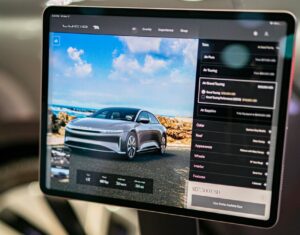
Home / EV Charging News / The Role of Smart Cities in Supporting Electric Cars: How smart city initiatives can integrate electric cars into a broader framework of sustainable urban development, including smart grids and intelligent transportation systems
As the world increasingly seeks sustainable solutions, smart cities are at the forefront of this transformative shift. These cities embrace advanced technologies and innovative approaches to enhance urban living, with a particular emphasis on environmental sustainability. In the realm of transportation, electric cars have emerged as a key component of smart city initiatives. By integrating electric vehicles (EVs) into the broader framework of sustainable urban development, including smart grids and intelligent transportation systems, cities can create an efficient and eco-friendly mobility ecosystem. This article explores the pivotal role that smart cities play in supporting electric cars and their integration into a sustainable urban landscape.
Smart grids serve as the backbone of a sustainable energy infrastructure, ensuring reliable and efficient electricity distribution. When it comes to electric cars, smart grids play a crucial role in providing an optimized and scalable charging infrastructure. By implementing grid monitoring and optimization technologies, cities can dynamically manage the demand for electricity, balance loads, and minimize strain on the grid. Additionally, smart grids enable demand response programs, allowing EV charging to be coordinated during off-peak hours, reducing the burden on the grid during periods of high electricity demand. Vehicle-to-Grid (V2G) technology takes it a step further, enabling EVs to feed excess stored energy back into the grid, contributing to grid stabilization and resilience.
Intelligent Transportation Systems (ITS) integrate advanced technologies and data analytics to optimize transportation networks. In the context of electric cars, ITS plays a vital role in enhancing EV infrastructure. Electric Vehicle Supply Equipment (EVSE) infrastructure, including charging stations and networks, can be strategically deployed and managed using intelligent transportation systems. These systems enable real-time monitoring of charging station availability and can guide EV drivers to the nearest and most suitable charging points, reducing range anxiety and promoting EV adoption. Moreover, dynamic charging technologies and wireless charging solutions can be seamlessly integrated into roadways and parking infrastructure, enabling continuous charging while vehicles are in motion or parked.
Data analytics and integration are fundamental in optimizing the usage of electric vehicles within a smart city framework. Predictive analytics can be leveraged to forecast charging demand, enabling cities to proactively plan charging infrastructure and allocate resources efficiently. Integration with public transportation systems is another aspect that enhances EV usage. By integrating electric cars with existing public transit networks, cities can provide seamless multimodal transportation options, encouraging more individuals to shift towards electric mobility. Mobility-as-a-Service (MaaS) platforms can also play a role by integrating EVs into comprehensive transportation services, allowing users to access various modes of transportation through a single platform.
Smart cities prioritize sustainability and environmental stewardship, making them ideal environments for electric cars to thrive. Local governments can incentivize electric vehicle adoption through policies such as subsidies, tax credits, and preferential parking. Urban planning can ensure the availability of EV charging infrastructure in key locations, including residential areas, workplaces, and public spaces. Collaborations and partnerships between municipalities, utility companies, and private entities can drive the development of a comprehensive EV ecosystem, fostering innovation and investment in sustainable mobility solutions.
The integration of electric cars into smart cities brings forth numerous benefits. Firstly, it significantly reduces carbon emissions and improves air quality, contributing to a healthier and cleaner urban environment. By leveraging renewable energy sources and optimized charging strategies, smart cities enhance energy efficiency and grid resilience, minimizing the environmental impact of EV charging. Additionally, the seamless integration of electric cars into smart city infrastructure promotes convenient mobility, providing individuals with sustainable transportation options that are efficient, reliable, and cost-effective.
Smart cities have the potential to revolutionize sustainable urban transportation by supporting and integrating electric cars into their infrastructure. Through the implementation of smart grids, intelligent transportation systems, data analytics, and urban planning strategies, cities can create an ecosystem that maximizes the benefits of electric mobility. The integration of electric cars into smart cities brings forth a host of advantages, including reduced emissions, improved air quality, enhanced energy efficiency, and convenient mobility options. As cities continue to embrace the concept of smart cities, the future holds immense potential for a sustainable and cleaner urban landscape powered by electric cars.
$4,150.00 Original price was: $4,150.00.$3,990.00Current price is: $3,990.00.
$10,690.00 – $11,390.00

Your Power Management Partner for Over 25 Years Future Generations Depend on Our Decisions Today ™
2024 © All rights reserved by CyberSwitching